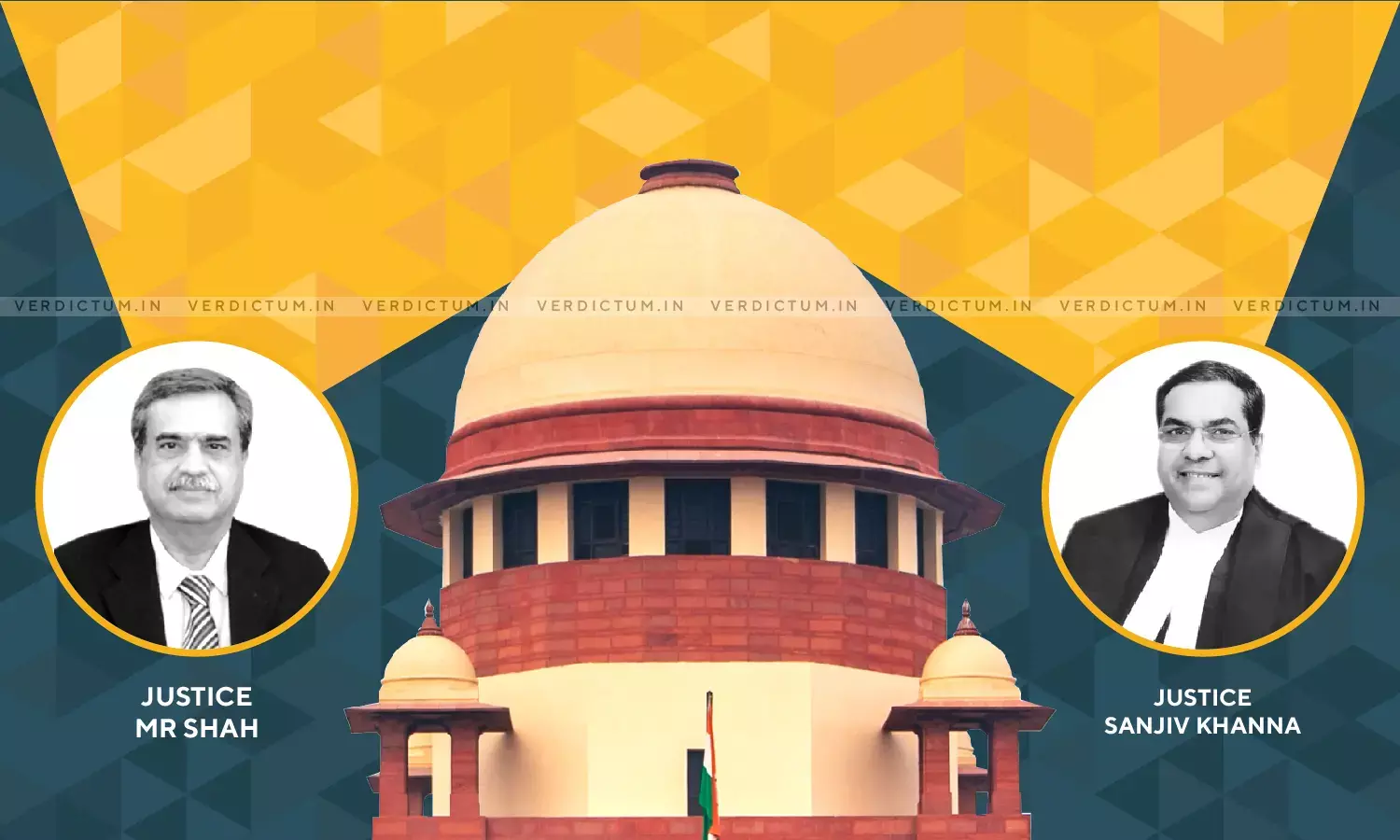Urban Land Ceiling Act- Repeal Act Of 1999 Will Not Affect Proceedings If Possession Of Land Had Been Taken: Supreme Court

A Bench of the Supreme Court consisting of Justice MR Shah and Justice Sanjeev Khanna has observed that the legal proceedings filed under Urban Land (Ceiling and Regulation) Act, 1976 will not abate in case the possession of the land had already been taken by the competent authority of the government before the Act was repealed in 1999.
The Bench has observed thus while explaining provisions in the principal Act, Urban Land (Ceiling and Regulation) Repeal Act, 1999 and rules made under it by the Government of Orissa. In this case, the High Court of Orissa had quashed and set aside the orders passed by the Competent Authority under the Act, 1976 declaring the land owned by the respondents as excess vacant land under the provisions of the Act, 1976. The High Court did so by citing that the compensation for the land had not been given to the Respondents. The High Court also held that as the Act, 1976 stands repealed, the lands belonging to the Respondents- landowners shall be given back to them.
As per the state of Orissa, the possession of the land in question was taken over by the Tehsildar in 1988, far before the Repeal Act came into force and hence the High Court erred in quashing the orders passed by the Competent Authority.
The Bench heard Advocate Sibo Sankar Mishra, appearing on behalf of the State and Senior Counsel Dr. Menaka Guruswamy, appearing on behalf of the Respondents.
The Bench explained Section 3 and 4 of the Repeal Act, 1999, which was adopted by the State of Orissa in 2002, to conclude that both the sections stipulate that the proceedings under the principal act shall abate in wake of the Repeal Act, which shall not apply in a case where the possession was taken the by the government.
"A fair reading of Sections 3 and 4 of the Repeal Act, 1999 makes it clear that all proceedings relating to any order made or purported to be made under the principal Act (Act, 1976) pending immediately before the commencement of the Repeal Act, 1999, before any court, tribunal or other authority shall abate. Section 4 of the Repeal Act shall not apply provided possession of land has been taken over by the State Government or any person duly authorised by the State Government in this behalf or by the competent authority," the Bench stated.
The Bench further noted that the issue as to whether possession of the land had been taken or not has to be considered before declaring the proceedings as having been abated. In case of the possession having been taken, the proceeding should not be declared as having been abated.
"If the possession of the surplus land/land has been taken over by the State Government or any person duly authorised by the State Government in this behalf or by the competent authority, in that case, the proceedings relating to any order made under the principal Act, 1976 shall not abate, meaning thereby that the Repeal Act, 1999 shall not affect all those proceedings with respect to the land of which the possession has been taken over," the Bench observed.
It further said, "Therefore, before declaring the proceedings as having abated in view of Sections 3 and 4 of the Repeal Act, 1999, it has to be considered and decided whether possession of the surplus land/land has been taken over by the State Government or any person duly authorised by the State Government in this behalf or by the competent authority or not. If it is found and held that the possession of the surplus land has been taken over, in that case, the proceedings shall not be declared as having been abated."
The Court noted that the High Court has not properly appreciated and considered the fact that the payment of compensation has nothing to do with the taking over of possession. Payment of compensation under the Act, 1976 and taking over the possession after the notification issued under Section 10(3)/10(5) of the Act, 1976, both are different and distinct.
"Even assuming that the compensation has not been paid, in that case also, it cannot be presumed that the possession was not taken over," the Bench stated while observing that the High Court has misread and misinterpreted the clarification resolution issued on July 24, 2002 after adopting the Repeal act.
"As per the said clarification dated 24.07.2002 no compensation should be paid for land, possession of which has not been taken over by the Government after vesting U/s. 10(3) of the Urban Land (Ceiling & Regulation) Act, 1976 and the legal process initiated under the said Act is also to be closed," the Bench observed.
The Bench observed thus by explaining that as per clause (ii) (of the clarification) where the possession of the land has been taken over and the compensation has not been paid or partly paid, steps should be taken for payment of compensation.
Therefore, the Court added, "even as per the said clarification dated 24.07.2002, where the possession of the land has been taken over and the compensation has not been paid or partly paid, the steps were required to be taken for payment of compensation. It does not speak and/or clarify that if the compensation is not paid, the possession is presumed to be not taken and/or the legal process initiated under the Act, 1976 will be closed."
The Bench then allowed the appeal and remanded the case back to the High Court to decide the case afresh within six months. The Bench asked the Respondents to deposit a cost of Rs. 50,000 with the National Legal Services Authority.
Case Title: State of Orissa & Ors Versus Sakhi Bewa (Dead) through Lrs.
Click Here to Read/Download the Judgment

